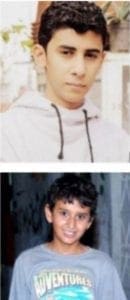 NO FURTHER ACTION IS REQUESTED. MANY THANKS TO ALL WHO SENT APPEALS.
NO FURTHER ACTION IS REQUESTED. MANY THANKS TO ALL WHO SENT APPEALS.
On 23 May 2020, Ebrahim Ahmed Radi al-Moqdad was released from Jaw prison, a day after the King of Bahrain issued a decree pardoning for Eid al-Fitr 154 prisoners who had served most of their sentences. Earlier on 18 March 2020, Jehad Sadeq Aziz Salman was among 1,486 prisoners released, amid the global threat posed by COVID-19. Of those released 901 received royal pardons on “humanitarian grounds” while the remaining 585, including Jehad, were given non-custodial sentences.
Jehad and Ebrahim were arrested on 23 July 2012, during an anti-government protest in Bilad al-Qadeem, west of Manama when they were still children. They were not allowed to speak to their families or to contact lawyers until nearly 48 hours after their arrest, and no lawyer present during their interrogation. Jehad and Ebrahim went on trial before the High Criminal Court in Manama along with four adults. On 4 April 2013, the court sentenced the two boys to 10 years’ imprisonment each and the men tried with them to 10 and 15-years’ imprisonment. They were convicted under articles of the Bahrain Penal Code and the 2006 anti-terrorist law with “intending to murder policemen”, “burning tyres on a main road”, “using force against two policemen, “burning a police car”, “illegal gathering” in order “to commit crimes and undermine public security”, and “possession of Molotov cocktails”. According to one of the boys’ lawyers, their conviction was based on “confessions” that they allege they were forced to sign, without the presence of a lawyer or a family member, and which they recanted during their trial. On 29 September 2013 the High Criminal Court of Appeal upheld the sentences which were later confirmed by the Court of Cassation.
Over the years, Amnesty International members organised solidarity actions on behalf of Jehad and Ebrahim and although the two boys did not receive the letters in prison, they and their families were aware of the actions.
ADDITIONAL RESOURCES
- READ THE FULL URGENT ACTION: Word or PDF
- GET INSPIRED: Read about the people you have helped
- READ TIPS for writing effective letters and emails
- CONTACT US: [email protected]
